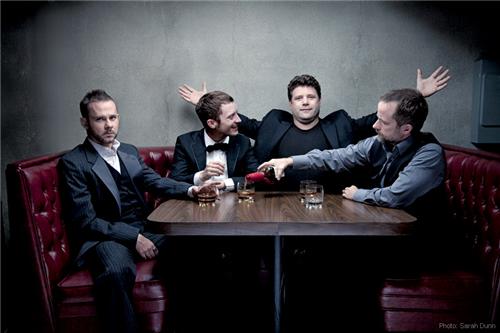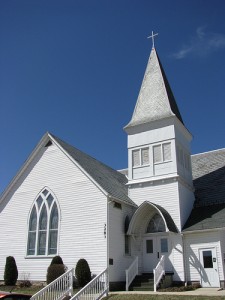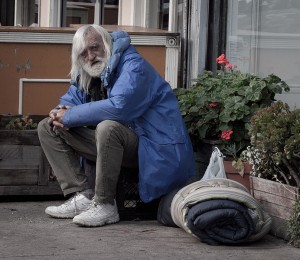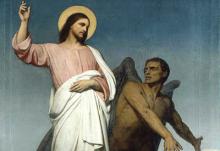Climate change

For three straight years, there have been more than three job seekers to every available job. Nineteen statistics about the poor in America that will absolutely astound you (or should.) Poll shows most Americans see deepening wealth gap. OpEd: Juliet Eilperin of Think Progress believes climate change could be a "wedge issue" in 2012 elections. Rolling Stone magazine on "How the GOP Became the Party of the Rich." And Obama leads with Latino voters going into 2012, while GOP frontrunners face backlash on immigration.
"Where my feminists at?" on #OccupyWallStreet. Test your global hunger knowledge. Race and OWS. Poverty in your backyard. How to be a "1 Percenter." OWS to march on banks. Romney embraces climate change denial. Magicians say their craft makes them see faith as little more than "hocus-pocus." Catholic University sued by Muslim students. And faith, political leaders find out how far food stamps actually go.
The high cost of anti-immigration laws. Why candidates' faith matters. ABC News' exclusive interview with President Obama. U.S. Hispanics choosing churches outside Catholicism. Three U.S. Congressmen tour the Canadian tar sands. Who are the death penalty's most ardent supporters? Investors worth a collective $20 trillion (with a T!) call for urgent action on climate change. And God's economy.
The Gubbio Project, which helps churches become refuges for homeless people throughout the U.S., recently earned a new fan: Author Anne Rice. "When I was in San Francisco, I visited St. Boniface Church in the Tenderloin and was moved by the sight of many peaceful homeless people sleeping in the pews of the church," Rice wrote on her Facebook.com page earlier this month. The author of the Vampire Lestat books and most recently the biblically-themed Christ the Lord novels and her spiritual memoir, Called Out of Darkness, provided her "people of the page" as she calls them, a link to the Gubbio Project where they could donate to "this fine work on the part of the Franciscans of St. Boniface in helping the homeless."
As of yesterday, more than 1,009 Americans have been arrested to bring national attention to the controversial Keystone XL pipeline. This is what church looks like. Liturgy means "the work of the people" in service of the common good.
If President Obama permits the Keystone pipeline, thousands more will sit on his doorstep and in front of bulldozers. This movement doesn't have money to match the influence of oil companies, lobbyists, or politicians with conflicts of interest, but we do have our bodies and we are putting them on the line.
Here are what people of faith -- Jews, Christians, Buddhists, Quakers, Unitarians, and more -- are saying about why they have been or will be arrested to stop the Keystone XL pipeline:
Rose Berger from Sojourners magazine spoke to the hundreds of us gathered in Lafayette Park just before we processed to the fence surrounding the White House. She mentioned the irony of building a monument to Dr. Martin Luther King, Jr. by the powerful political forces who disregarded or dismissed his message during his lifetime -- we only honor him after he is safely dead. How ironic also that the dedication of the monument was postponed by the most recent example of significant climate change. Will evidence of climate change begin to also signal political change?
Rose called on us to take up the banner of the Living Spirit of Dr. King within ourselves and allow it to inspire us as we risked arrest by calling on President Obama to take a clear stand to help protect our environment and begin to make a U-turn from the climate change path we are traveling as a nation and culture. We are part of a two-week vigil and civil disobedience action calling the president to deny permission for building the proposed Keystone XL Pipeline from the environmentally devastating tar sands/oil shale development in Alberta, Canada to refineries in Texas.
We had a very hot ride in the police van, but the Park Police processed us very quickly. We were released from custody and greeted outside with water, granola bars, and hugs. What could be better?
But the point was not to get arrested. The point was to make of our lives a living witness. To make it clear that climate change has gone too far and we are no longer going to stand idly by while our sisters, brothers, and home planet are torn apart by oil companies. Here are a handful of photos from the event yesterday:
I want to beat televangelist Pat Robertson to the jump on yesterday's East Coast earthquake.
Robertson is genius at knowing the mind of God when it comes to natural disasters. He blamed the Haiti earthquake on a God-offending "pact with the devil." Hurricane Katrina was God's pay-back for abortion in America.
Having spent some time with the Lord recently, I feel there is a message for President Obama: It is God's wrath that shook the White House yesterday. This was a 5.8 wake-up call.
Why is God all wrought up this time? What is it that God wants President Obama to do? Well, my friends, the issue is climate change. Global warming. Specifically, the Keystone XL "Dirty Oil" pipeline.
For the past 30 years, through my work with Maryknoll and Pax Christi International, I've come to know grassroots communities around the world in situations of war and poverty. My mission focus base been largely international, but people, were in the "center of my screen." The environment, I thought, would have to wait.
A few weeks ago, I went with two of my grandchildren, Lauren (10) and Bobby (9), to see the documentary Hubble, which is about NASA's final shuttle expedition to repair a a broken part of the Hubble telescope. We watched in awe at the spectacular photos of the expanding universe. What an amazing sense these photos give of our own location as humans who are part of a larger earth community, who are part of a cosmos with which our own future is inextricably linked.
Won't it reduce our dependence on Middle Eastern oil? Won't somebody else develop the Alberta tar sands if the U.S. doesn't do it -- someone like China, perhaps?
I've been wrestling with many of these issues as I contemplate risking arrest as part of two weeks of sustained protest by leading environmentalists, climate scientists, and faith-based groups at the White House forth to pressure the Obama Administration to block the Keystone XL Pipeline. This pipeline project will connect Canadian tar sands -- containing the second largest and dirtiest oil reserves on the planet -- with the oil refineries in Texas.
If the United States is a fossil fuel addict, then the Alberta tar sands are our next big fix.
The tar sands contain the largest oil reserves in North America and their extraction has been called "the most destructive project on earth". The proposed Keystone XL Pipeline would carry oil from the tar sands down to Texas refineries, making it available for our consumption and pushing a turn to green energy sources even further down the road.
Borrowing wisdom from the twelve step program pioneered by Alcoholics Anonymous, theologian Ched Myers contends that addiction -- "the inability to say no because of captivity to pathological desires" -- names our spiritual and cultural condition. Perhaps nowhere is this clearer than in the case of fossil fuels.
While Earth Day and Good Friday being on the same date this year was a relatively rare alignment, thankfully for many people the everyday companionship of religious belief and care for creation i
The April issue of Sojourners magazine takes on climate change denial. One challenge is that the truth is hard to face -- but, as scientist Sasha Adkins describes from personal experience, one strategy is to draw inspiration from the comforts of home.
The question that I am most often asked when I talk about my Ph.D. research on the impacts of pollution has nothing to do with my methodology or my data. It is, "How do you live with this knowledge? Where do you find your hope?" It's a good question. My research results on the impact of plastics on human health and the environment are often quite demoralizing to hear. More than once when I am presenting them, an audience member has literally started to cry.
I took a year off from my environmental studies program to search for the answer to that very question, to find hope -- but this time, instead of turning to peer-reviewed journals for answers, I turned to my cats. I asked them if they would be willing to try living without fossil-fuel heat for the winter.



